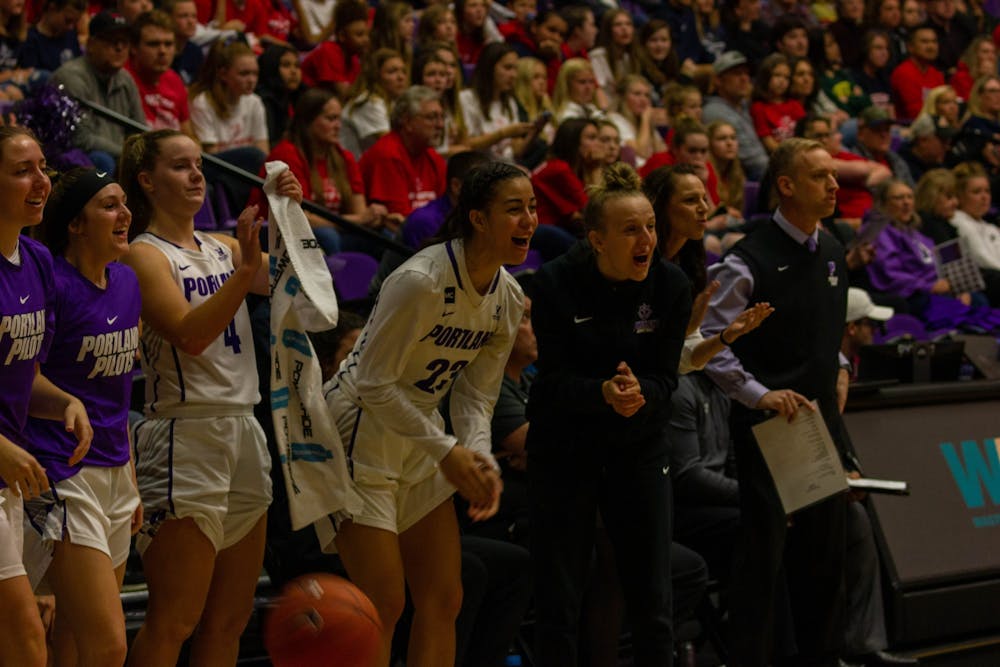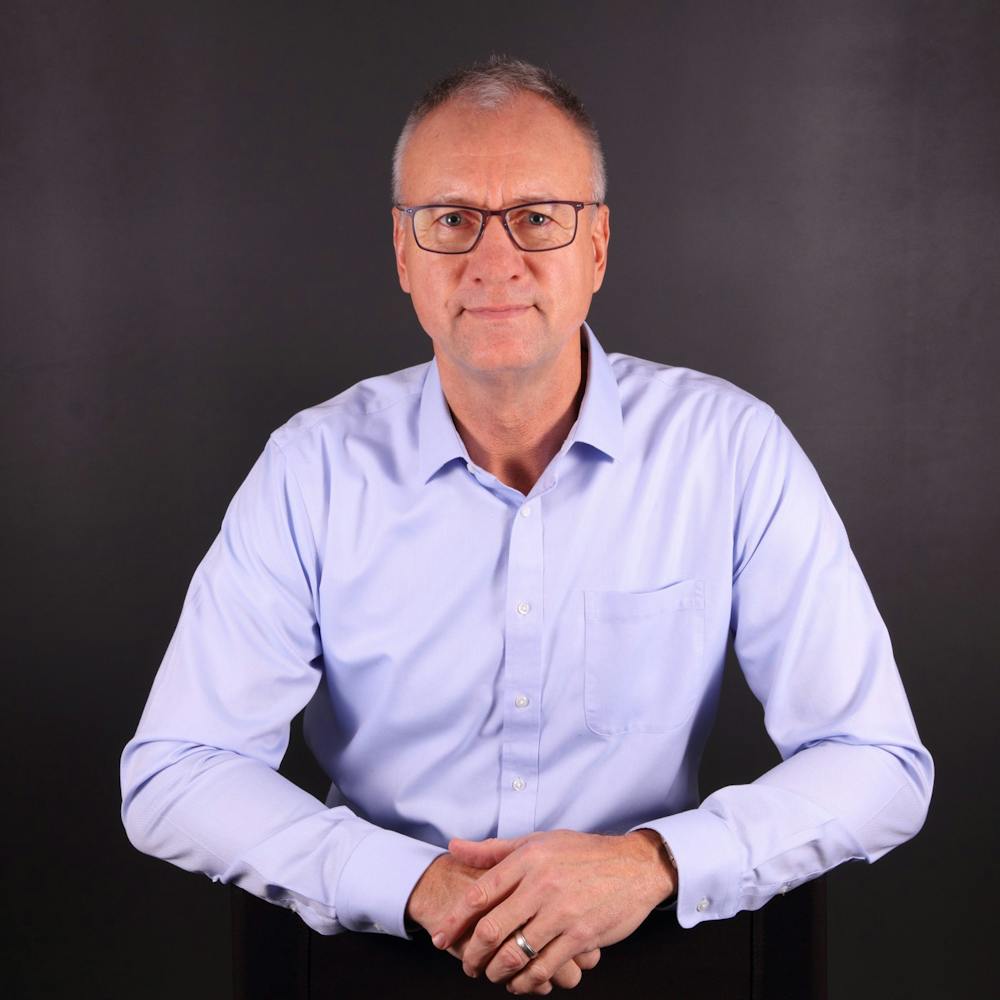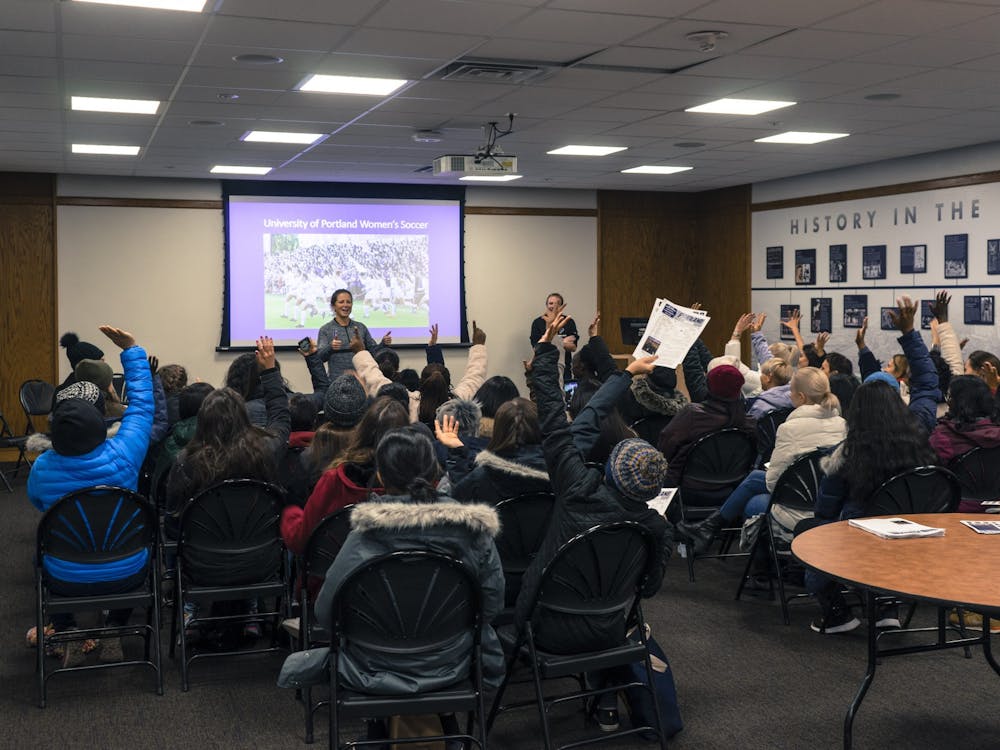Even in the middle of the coronavirus pandemic, business goes on for Jim Etzel and his organization Sport Oregon, mostly as usual.
Although everything is virtual and there’s an influx of administrative work, like filing paycheck protection applications and calling partners, they are still doing what they do best: working to bring sporting events like the NCAA Women’s Final Four to Oregon.
Jim Etzel’s name may ring familiar because of his father, Joe Etzel — the namesake of University of Portland’s baseball stadium, as well as being the former UP baseball coach and UP Athletics director for 34 years, one of the longest in college sports history.

The University of Portland women's basketball team just experienced its best season since 1997.
Jim is the CEO of Sport Oregon, a non-profit that works with Oregan companies to attract sporting events and franchises to the state. They have played a critical role in the competitive bidding process and getting Portland selected as one of four finalists to host the Women’s Basketball Final Four in 2025 or 2026. If Portland is selected, it would be the first time they have ever hosted a Final Four.
Jim is optimistic about his chances of getting the Final Four but isn't taking anything for granted.
“We're going to bust our butt to make the best case for Portland, Oregon,” Jim said. “If we don't get it this cycle, we're going to get it in the next one.”
Portland is competing against Phoenix, Columbus and Tampa Bay. Phoenix has never hosted the tournament, but Columbus hosted it in 2018 and Tampa has hosted it three times.
Jim is a big player in the Oregon sports world. John Canzano, a sports columnist with the Oregonian, named him to his 2019 top 25 most influential people in Oregon sports.
Sport Oregon has helped bring other events to Oregon like the IAAF World Indoor Track & Field Championships, Davis Cup Quarterfinal, Major League Soccer All-Star Game and the NCAA women’s basketball tournament regional to Oregon.
Part of the reason that Jim is confident about Portland's chances is that the city hosted the most successful NCAA women’s west-regionals in 2019 and was on track to do even better this year before it was canceled due to COVID-19.
“When I'm going to Indianapolis to make a presentation for the women's Final Four and they go ‘you think we can sell out Portland?’ We just hosted the best women's regional … We set a record of almost 12,000 fans,” Jim said of the west-regionals in 2019.

Even in the middle of a pandemic, Jim is up for the challenge. He and his team are continuing to drive the bid for the Final Four, focusing on the logistics of it, like venues and hotels, trying to position Portland as best as possible to receive the bid.
UP Athletic Director Scott Leykam described Jim as an “outside the box thinker” upon being named the executive director of Sport Oregon in 2017.
Jim’s sister, Susan Etzel, the associate director of University Events at UP, who worked with Jim professionally for nearly 10 years, corroborated Leykam’s comment, saying that one of Jim’s biggest strengths is his creativity.
“(Jim’s) really creative about thinking how different people will work well together, what they would have in common, or how they can leverage each of their specialties,” Susan said.
Jim, Susan and their two other siblings practically grew up on The Bluff. Some of Jim’s first memories are from when he was the ball and bat boy for the Pilots. From middle school through college, Jim worked grounds maintenance on campus, trimming nearly every hedge and cutting every blade of grass on The Bluff.
“Our life really revolved around UP,” Susan said. “Growing up from the time we were born until we went to school there … we literally bleed purple.”
One of the most important lessons Jim learned on The Bluff didn’t come in the classroom, but on the baseball field: learning to focus on what he could control and not dwell on what he couldn't, helping him create a selfless-tenacity that allows him to swallow his ego and prioritize the long term goals.
“(I’m) used to kind of an underdog mentality, part of it is growing up on the UP baseball field,” Jim said. “We didn't have the fanciest baseball stadium back then … but we had the nicest, best playing field … north of San Francisco. It was because we rolled up our sleeves and did it … We didn't complain, ‘oh, our field wasn't as nice as Oregon State or Washington State,’ we kicked their ass on our playing field, because we worked harder at it, you know, things you can control.”
Leykam describes Jim as a selfless person who strives to make the community better.
“Jim is the ultimate connector, whether it benefits Jim personally or not,” Leykam said. “He will connect one event with another, or a mentor with a man, or a client with a potential sponsor. Jim is incredibly selfless and is always trying to make everybody in this community better.”
This selflessness is what has propelled Jim professionally.
“We all have egos,” Jim said. “You have an ego. I have an ego and I just think (through) being real and being humble … (You can) turn ego into confidence and be quietly confident. And don't throw it in people's faces when you're successful, share the glory, give credit where it's due, and give credit where maybe it's not due but it's gonna pay off.”
Even in difficult times, Jim is looking to stay positive and focus on what he can control.
One potential silver lining is that when events in other cities start to reschedule, many will be forced to relocate because venue space isn't available. He and Sport Oregon will work to position Oregon as a new home for displaced events.
They will also continue to strengthen Portland as a candidate to host the Final Four between now and September, when they make their final presentation. In spite of his belief that Portland is a strong contender, he is still looking at it through the lens of an underdog, quietly confident.
“At the end of the day we’ll put our best effort forward and hopefully it's good enough,” Jim said. “I will be really disappointed if we don't win but that's the competitive nature of all of us. I don't take it for granted though, because, candidly, if I come across that way, then we are going to lose. I just love our chances, doesn't mean we're going to get it. I don't get to stay in the room and influence that room, but I can influence our moment with them.”
William Seekamp is a reporter at The Beacon. He can be reached at seekamp22@up.edu.








